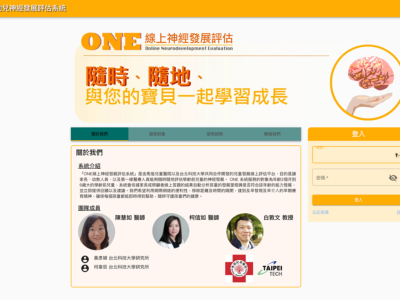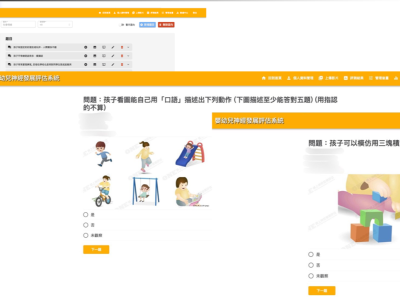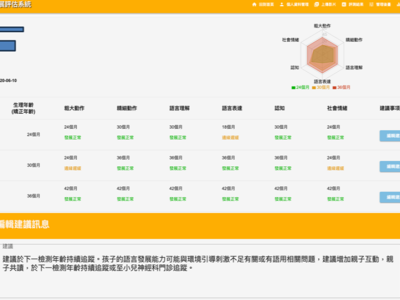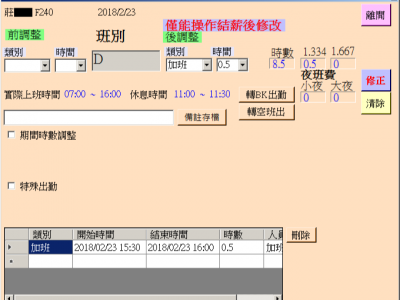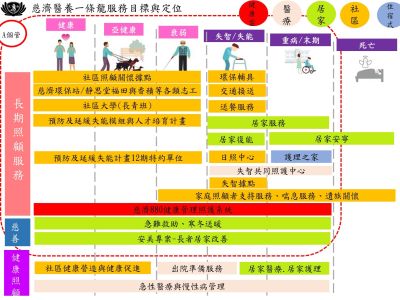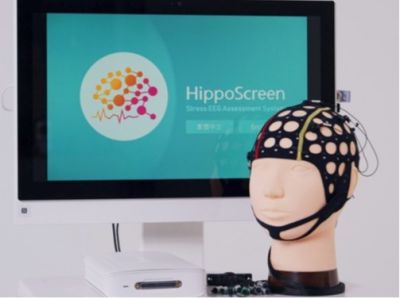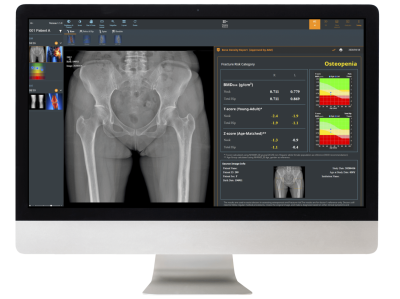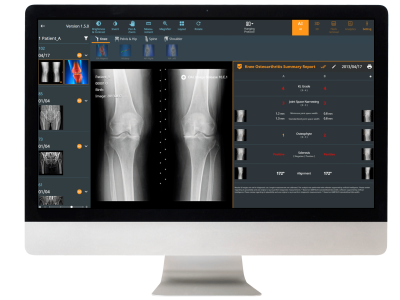Information
An Intelligent Online Neurodevelopmental Evaluation (ONE) System is a brand-new, intelligent, individualized, and automated online developmental assessment system designed based on the neurodevelopmental characteristics of children in Taiwan. It offers the following six key clinical practical values:
- Individualized Child Developmental Ability Assessment:
The most distinctive feature of this system is its ability to assess a child's developmental age rather than merely screening for normal or abnormal development. It simulates the preliminary assessment function of clinical physicians in child development and serves as a system for domestic child development monitoring.
- Intelligent Analysis of Children's Developmental Abilities Across Six Key Domains:
This system comprehensively covers six core aspects of child development, including gross motor skills, fine motor skills, language comprehension, language expression, cognition, and socio-emotional development. It provides caregivers and medical professionals with a holistic understanding of a child's developmental abilities.
- Accessible Online Assessment Anytime, Anywhere:
Parents or teachers can conduct online neurodevelopmental assessments for children anytime and anywhere. The system provides immediate home-based educational guidance for caregivers or medical referral recommendations, eliminating the inconvenience of hospital visits.
- Regular Tracking and Monitoring of Child Neurodevelopment with Reminders:
Through the ONE system's periodic tracking and assessment mechanism, parents are reminded to regularly check their child's development and identify developmental issues early. The system also presents a long-term developmental trajectory, allowing primary caregivers to clearly understand a child's weaker abilities and provide early home-based guidance or seek medical confirmation and treatment as soon as possible.
- Preliminary Early Intervention Assessments for Rural Areas:
Traditionally, assessments in remote areas require a team of early intervention professionals to conduct screenings, which is time-consuming and labor-intensive. With this system, social workers or public health nurses can use the platform to conduct online screenings for underprivileged children in communities or rural areas. It helps identify potential cases for hospital referrals, enabling early detection of developmental delays caused by environmental disadvantages. The system also provides educational resources for parents and access to social services, embodying the early intervention principle of "early detection and early treatment."
- Hierarchical Medical Referral System for Child Development, Reducing Unnecessary Medical Resource Waste:
By utilizing the ONE system for preliminary assessments, cases that truly require entry into the early intervention evaluation system can be automatically screened and referred. This helps alleviate the long waiting times currently experienced in early intervention centers and serves as a foundational step for future early intervention and telemedicine referral systems.
Benefits
An Intelligent Online Neurodevelopmental Evaluation (ONE) System was developed over the course of three years. The personal data protection measures for the subjects on the system are fully regulated by the Institutional Review Board (IRB) of Mackay Memorial Hospital. As of October 2024, the system has accumulated 1,472 uses, with 904 unique users. Among them, 166 are preterm infants (18.4%), and the majority (738, 81.6%) are full-term children. The system detected developmental abnormalities in 26.9% of full-term children and 33.2% of preterm infants. Additionally, 239 random cases were invited for early intervention clinical assessments and cross-validated with the system. The results showed that the system's accuracy, precision, and sensitivity were 90.3%, 95.0%, and 92.4%, respectively, indicating the excellent capability of the system in detecting developmental issues.
To assess the system's feasibility in rural areas, 338 children from these regions participated in the online developmental screening through the ONE system. The screening results showed that 27.2% of the children did not pass in at least one developmental area, confirming that the ONE system is effective in identifying over 70% of children suspected of developmental delays. Furthermore, the system uses the Rasch Model to conduct automatic internal validity checks. By calculating residuals, the system verifies whether the response patterns align with the model. The system's internal construct validity was confirmed, as the fit statistics (Outfit and Infit) showed that responses across all six developmental domains had a strong linear correlation with the children's age, indicating a high level of internal construct validity and test-retest reliability.
We also found that some children showed improvement from borderline developmental delays to normal development in the next age group. The improvement rates ranged from 7.8% to 13.2%, with the highest improvements seen in fine motor skills (13.2%) and social-emotional development (12.9%). Gross motor skills (9.1%) and language expression (9.8%) showed somewhat lower improvement rates. With regular assessment reminders, the system successfully helped reduce developmental delays by an average of 10.1%. Satisfaction surveys also indicated that most users were very satisfied with the system.
